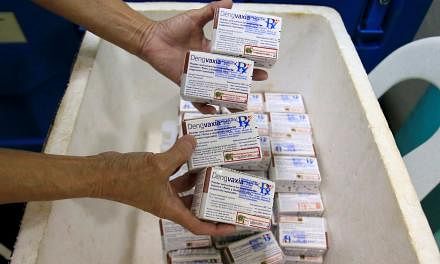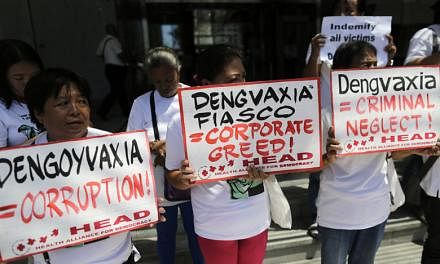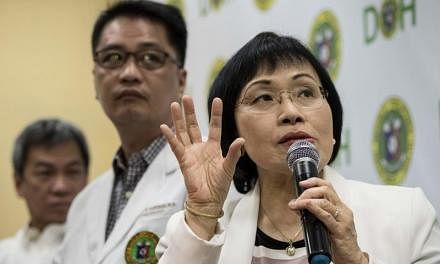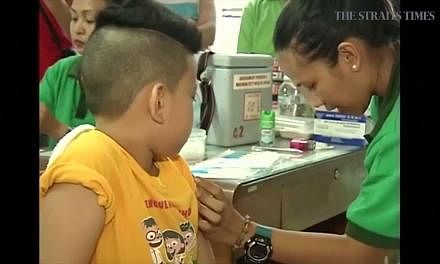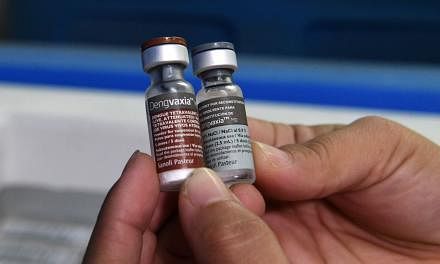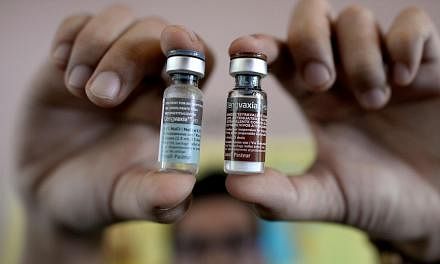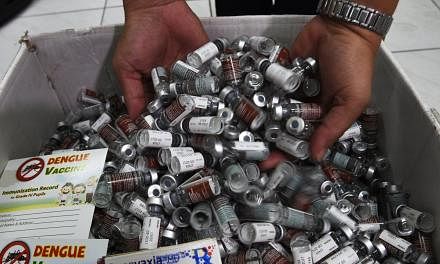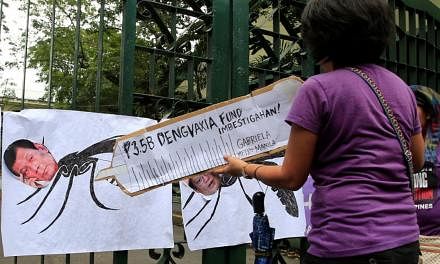MANILA - A chink in the armour of Sanofi Pasteur's groundbreaking dengue vaccine is stirring a debate here, not just over public health, but also the political wisdom behind the decision to subject over a million children to what essentially is a still inconclusive clinical trial.
Sanofi, the French pharmaceutical giant, issued an alert last week saying Dengvaxia, the world's first dengue vaccine, could pose health risks in people not previously infected by the deadly, mosquito-borne tropical disease.
The backlash was quick.
The Philippine Department of Health halted its 3.5 billion-peso (S$79.8 million) dengue vaccination programme on Friday (Dec 1), following Sanofi's latest advisory.
Regulators ordered a recall of the drug and stopped sales while government prosecutors began building a case against officials who approved the programme, including former president Benigno Aquino.
Public health advocates who had opposed the programme are making the rounds on radio and TV to tell everyone: "We told you so." Politicians are demanding that Sanofi refund the government, bloggers have been bandying about words like "genocide" and "scam", and lawyers are encouraging the parents of children who were inoculated to file a class action suit against Sanofi.
The reactions may seem disproportionate to the cause but it bears reminding that this is as much about politics, as it is a public health issue.
Mr Aquino is in the cross hairs.
He is being investigated for sanctioning in 2015 a massive immunisation programme despite concerns over Dengvaxia and caveats issued by the World Health Organisation (WHO) over safety risks.
Public health advocates had warned that the scale of the programme - over a million children aged nine and older - was too vast to be effectively monitored over a long period of time.
The monitoring was necessary considering information that Dengvaxia is found to be effective only against milder types of dengue, and that it may possibly lead to deadlier strains.
The WHO, in a August 2016 position paper, did not recommend that Dengvaxia be introduced to national immunisation programmes. But it did set parameters that nations could use, based on current data, in determining whether to introduce the vaccine.
Justice Secretary Vitaliano Aguirre is now asking why Mr Aquino approved Dengvaxia's use despite the risks.
"We have to know why (the health department) ordered such a huge amount of vaccine and immediately vaccinated 733,000 schoolchildren. Is that appropriate?" he said.
He added: "The next question is did the (department) heed the warning? What was the effect (of the vaccine)? Then we have to look if there was criminal liability or graft."
This is not the first time the government of President Rodrigo Duterte has tried to build a case against Mr Aquino.
The former president is being held accountable for the deaths of dozens of special forces troops during a botched raid in 2015 on the lair of Malaysian terrorist Zulkifli bin Hir, alias Marwan. He has also been accused of misusing his "pork barrel" funds.
Now, this so-called dengue mess is again being pinned on him.
The pressure on Mr Aquino stems from suspicions that he and his political party are behind recent efforts to unseat Mr Duterte.
Mr Duterte himself has accused Mr Aquino's Liberal Party of purportedly conniving with communists to destabilise his government.
All this political noise, however, is obscuring the fact that while Dengvaxia may not be 100 per cent effective, it is not totally useless.
Dr Ng Su Peing, Sanofi's global medical head, said the vaccine has prevented 65.5 per cent of dengue infections and averted nine in 10 cases of severe dengue.
That percentage means over 470,000 of the 730,000 children already inoculated will be spared contracting a disease that infects 390 million and kills 13,000 across the world each year.
Yet Sanofi's latest alert does create uncertainty, and that uncertainty is magnified the larger the scale.
Dr Anthony Leachon, former president of the Philippine College of Physicians Foundation and among the public health advocates who warned Congress about Dengvaxia, said it is unlikely the government or Sanofi will be able to keep close track of the hundreds of thousands of children who have already received the first dose.
"It means some of them will develop severe dengue; we don't know who. All of them will have to live with this possibility for the rest of their lives," he said.


